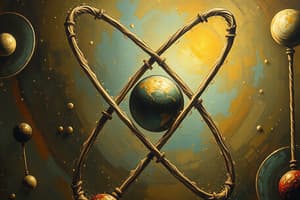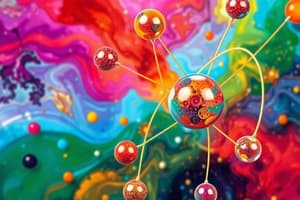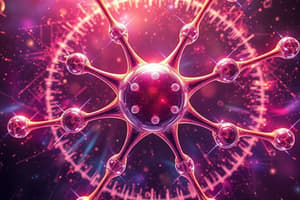Podcast
Questions and Answers
How many of the following are considered elements (as opposed to compounds)? He, F2, HCl, S8
How many of the following are considered elements (as opposed to compounds)? He, F2, HCl, S8
- 2
- 3
- 0
- 1 (correct)
- 4
How many of the following are examples of a chemical change? Pulverizing (crushing) rock salt, Burning of wood, Boiling of water, Melting a popsicle on a warm summer day.
How many of the following are examples of a chemical change? Pulverizing (crushing) rock salt, Burning of wood, Boiling of water, Melting a popsicle on a warm summer day.
- 2
- 4
- 3
- 0
- 1 (correct)
Which of the following is a homogeneous mixture?
Which of the following is a homogeneous mixture?
- Copper metal
- Pure water
- Gasoline (correct)
- Soil
- Jar of jelly beans
What are the three states of matter?
What are the three states of matter?
What is the difference between elements and compounds?
What is the difference between elements and compounds?
What is a pure substance?
What is a pure substance?
A physical change transforms a substance into one or more new substances.
A physical change transforms a substance into one or more new substances.
Compounds can be chemically broken down into simpler substances.
Compounds can be chemically broken down into simpler substances.
Flashcards are hidden until you start studying
Study Notes
The Nature of Matter
- Matter is defined as anything that has mass and occupies space, composed of tiny particles called atoms.
Elements and Compounds
- Elements consist of only one type of atom. Examples include elemental copper (Cu) and elemental gold (Au).
- Compounds are substances made up of two or more different types of atoms bonded together.
States of Matter
- Matter exists in three primary states:
- Solid: Rigid with a definite shape.
- Liquid: Has a definite volume but conforms to the shape of its container.
- Gas: Takes both the shape and volume of its container.
Properties of Matter
- Matter possesses both physical and chemical properties:
- Physical properties do not change the substance's composition (e.g., shape, size, color).
- Chemical properties describe a substance's capacity to undergo a chemical change.
Changes in Matter
- Matter undergoes:
- Physical changes: Involves alterations in physical properties without changing composition.
- Chemical changes: Result in the formation of one or more new substances.
Classifying Matter
- Matter can be categorized as either a mixture or a pure substance.
Mixtures and Pure Substances
-
Mixtures have variable compositions:
- Homogeneous mixtures exhibit consistent properties throughout (e.g., solutions).
- Heterogeneous mixtures display distinct properties in different portions.
-
Pure substances always maintain the same composition:
- Comprised of elements that cannot be chemically broken down.
- Comprised of compounds that can be separated into simpler substances (e.g., water as H2O).
Separation of Mixtures
- Mixtures can be separated into their pure substances through:
- Distillation: Utilizing differences in boiling points.
- Filtration: Separating based on particle sizes.
Concept Checks
- Assess understanding through questions involving identification of elements vs. compounds and examples of physical vs. chemical changes.
Studying That Suits You
Use AI to generate personalized quizzes and flashcards to suit your learning preferences.




